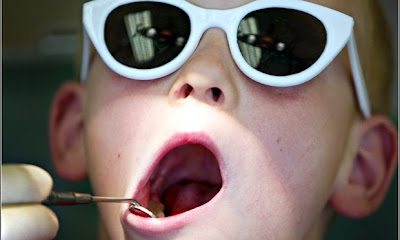 |
| There is misunderstanding about the importance of looking after children’s early milk teeth and gums, says Nice. | Image Source: theguardian.com |
Children as young as three are suffering from severe tooth decay and people need to “act now to stop the rot”, health officials have said.
The National Institute for Health and Care Excellence (Nice) has urged local authorities to tackle a growing crisis in the state of people’s teeth in disadvantaged areas of England.
Tooth decay and gum disease are the two most common, largely preventable dental problems. Those most at risk are from the most vulnerable sections of society and who are dependent on others to care for them, such as young children and frail older people who need help to stay independent, Nice said.
The health body said schools and nurseries should help children brush their teeth, adding that severe tooth decay had been reported in children as young as three and in many cases was starting much earlier.
Professor Mike Kelly, the director of the centre for public health at Nice, said: “Children as young as three are being condemned to a life with rotten teeth, gum disease and poor health going into adulthood.
“Many children have poor diets and poor mouth hygiene because there is misunderstanding about the importance of looking after children’s early milk teeth and gums.
“They eat too much sugar and don’t clean their teeth with fluoride toothpaste. As a society we should help parents and carers give their children the best start in life and act now to stop the rot before it starts.”
Prof Kelly said there were wide regional differences in oral health, and said the situation was “bleak for many adults as well as children in disadvantaged areas”.
He added: “Diet, poor oral hygiene, smoking, alcohol and a lack of understanding about oral health are causing tooth decay, gum disease, tooth loss and increasing the risk of mouth cancers. These are also the risk factors causing many chronic conditions, including heart disease and diabetes.”
Nice suggests local authorities consider supervised tooth-brushing and fluoride varnishing programmes in nurseries and primary schools in areas where children are at high risk of poor oral health.
Professor Elizabeth Kay, foundation dean for the Peninsula Dental School in Plymouth, said: “Around 25,000 young children every year are admitted to hospital to have teeth taken out. Given that we know how to prevent dental disease this really should not be happening. If there were a preventable medical condition which caused thousands of young children (mostly around five years old) to end up in hospital to have body parts removed, there would be an outcry.”
Dr Sandra White, director of dental public health at Public Health England, said: “Tooth decay is the most common oral disease affecting children and young people in England, yet it is largely preventable.
“Whilst children’s oral health has improved over the past 40 years, one in eight (12%) three-year-olds have suffered from the disease, which can be very painful and even result in a child having teeth removed under general anaesthetic.
“Oral health is everyone’s responsibility and by expanding oral health education to the wider community so that nurseries, children’s centres and primary schools all play a role, we can reduce dental decay and ultimately improve the oral health of the local population.”
Subscribe to this Dr. John Pasqual blog to learn more about proper teeth care to avoid dental problems.